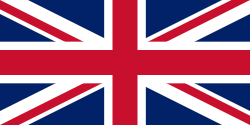
Back Llingües del Reinu Xuníu AST Llengües del Regne Unit Catalan Ieithoedd y Deyrnas Unedig Welsh Lenguas del Reino Unido Spanish Langues au Royaume-Uni French Մեծ Բրիտանիայի լեզուներ Armenian Bahasa di Britania Raya ID Yethow an Ruvaneth Unys KW Språk i Storbritannia NB Línguas do Reino Unido Portuguese
| Languages of the United Kingdom | |
|---|---|
 Sign by a canal in London. | |
| Main | English (98%;[1] national and de facto official)[a][2][3][4] |
| Minority | UK Wide: Scots (2.23%) (2022),[5] Welsh (0.9%) (2021),[6] Cornish (<0.01% L2),[7][8][9] Scottish Gaelic, Irish,[a] Ulster Scots (0.05%),[10] Angloromani, Beurla Reagaird, Shelta |
| Immigrant | Polish, Punjabi, Urdu, Bengali, Sylheti, Gujarati, Arabic, French, Chinese, Portuguese, Spanish, Tamil[11] |
| Signed | British Sign Language, (0.002%)[c][12] Irish Sign Language, Signed English, Northern Ireland Sign Language |
| Keyboard layout | |
| Part of a series on the |
| Culture of the United Kingdom |
|---|
 |
English is the most widely spoken and de facto official language of the United Kingdom.[13] A number of regional and migrant languages are also spoken. Indigenous regional languages include the Celtic languages Irish, Scottish Gaelic and Welsh and the West Germanic Scots and Ulster Scots. There are many non-native languages spoken by immigrants, including Polish, Hindi, and Urdu. British Sign Language is sometimes used as well as liturgical and hobby languages such as Latin and a revived form of Cornish.[14][15][16]
Welsh is spoken by 538,300 people in Wales according to the 2021 census,[17] though data from the Annual Population Survey shows that 28%, or roughly 862,700 people, of Wales' population aged three and over were able to speak the language in March 2024.[18] Welsh is a de jure official language under the Welsh Language (Wales) Measure 2011 in Wales.[19][20]
Irish is spoken by about 124,000 people in Northern Ireland, and is now a de jure official language there alongside English.[21]
- ^ According to the 2011 census, 53,098,301 people in England and Wales, 5,044,683 people in Scotland, and 1,681,210 people in Northern Ireland can speak English "well" or "very well"; totalling 59,824,194. Therefore, out of the 60,815,385 residents of the UK over the age of three, 98% claim they can speak English "well" or "very well".
- ^ "United Kingdom". Languages Across Europe. BBC. Archived from the original on 2 November 2020. Retrieved 21 November 2013.
- ^ "United Kingdom; Key Facts". Commonwealth Secretariat. Archived from the original on 23 January 2012. Retrieved 23 April 2008.
{{cite journal}}: Cite journal requires|journal=(help) - ^ "English language". Directgov. Archived from the original on 15 October 2012. Retrieved 21 November 2013.
- ^ Scots - Languages - gov.scot. Out of the 67.6 million residents of the UK over the age of three, 1,508,540 (2.23%) can speak Scots, link.
- ^ The usual resident population of England and Wales was 59,597,300 on Census Day, 21 March 2021, and 538,300 said they could speak Welsh 2021 Census from the Welsh Language Commisioner's website
- ^ "Language in England and Wales: 2011". Retrieved 10 September 2022.
- ^ "The rebirth of Britain's 'lost' languages". Retrieved 25 October 2022.
- ^ Hurn, Brian J. (2013). Cross-cultural communication : theory and practice. Barry Tomalin. Houndmills, Basingstoke, Hampshire: Palgrave Macmillan. p. 65. ISBN 978-0-230-39114-7. OCLC 844188225.
- ^ Anorak, Scots. "Ulster Scots in the Northern Ireland Census". Scots Language Centre. Archived from the original on 4 May 2015. Retrieved 21 November 2013.
- ^ "2011 Census: Quick Statistics". Archived from the original on 25 August 2014. Retrieved 17 May 2014.
- ^ "BSL Statistics". Sign Language Week. British Deaf Association. Archived from the original on 15 April 2021. Retrieved 5 February 2021.
- ^ "Toponymic guidelines for map and other editors, United Kingdom of Great Britain and Northern Ireland". GOV.UK. Retrieved 28 September 2024.
- ^ "Language in England and Wales - Office for National Statistics". www.ons.gov.uk. Archived from the original on 7 January 2019. Retrieved 23 July 2020.
- ^ Mac Síthigh, Daithí (March 2018). "Official status of languages in the United Kingdom and Ireland". Common Law World Review. 47 (1): 77–102. doi:10.1177/1473779518773642.
- ^ Dunbar, R (2007). Diversity in addressing diversity: Canadian and British legislative approaches to linguistic minorities and their international legal context. In: Williams C (ed) Language and Governance. Cardiff: University of Wales Press. p. 104.
- ^ "Welsh language in Wales (Census 2021)". GOV.WALES. 6 December 2022. Retrieved 6 December 2022.
- ^ "Welsh language data from the Annual Population Survey: April 2023 to March 2024". Welsh language data from the Annual Population Survey: April 2023 to March 2024. Welsh Government. 27 June 2024. Retrieved 11 August 2024.
- ^ "Welsh Language (Wales) Measure 2011". legislation.gov.uk. The National Archives. Archived from the original on 26 April 2016. Retrieved 30 May 2016.
- ^ "Welsh Language Measure receives Royal Assent". Welsh Government. 11 February 2011. Archived from the original on 22 September 2013. Retrieved 21 November 2013.
- ^ "Irish language and Ulster Scots bill clears final hurdle in Parliament". BBC News. 26 October 2022. Retrieved 27 October 2022.
